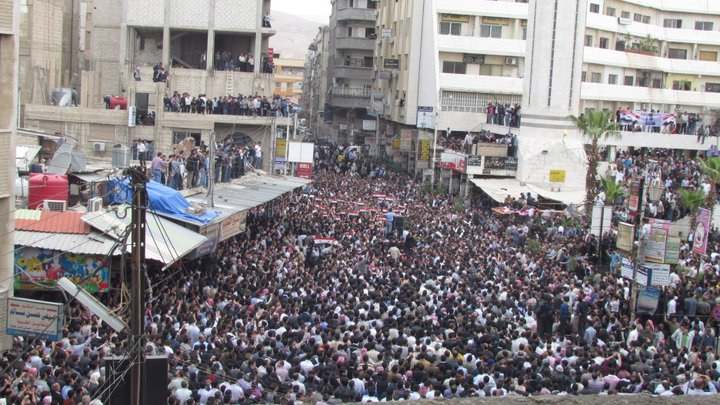UPDATES
‘Multi-Party’ Reform: Too Little, Too Late for Assad?
July 26, 2011 | Geoffrey Levin

In its biggest concession thus far to the protest movement that has swept the country, the Syrian cabinet on Sunday approved a bill permitting new political parties to exist alongside the Baath Party, which has ruled the country alone for over four decades. Yet the opposition understandably views the bill, which has yet to pass a vote before the parliament, with deep skepticism, as it comes after the government killed over 1,500 protestors. Al Jazeera reports:
Yasser Saadeldine, a Syrian opposition figure living in exile, said the new law “is designed to show on paper that the regime tolerates dissent while continuing killings and repression”.
Reporting from Beirut, Al Jazeera’s Rula Amin said that protesters are dismissing the draft law. The people are demanding “political freedoms, not just a law to organise how to form political parties”.
“We spoke to some opposition figures and they said, ‘What’s the use of this law if we cannot travel to Deraa and Baniyas and Latakia and to different Syrian cities and be able to meet with people and assemble? What’s the use of the law if we are going to be persecuted by the security forces for simply disagreeing with the government or be put in prison for organising a political meeting?'”
Former US Deputy National Security Adviser Elliott Abrams also doubts Syrians will take the proposed legislation seriously, and notes the hypocrisy inherent in the way the Bath Party worded the bill:
According to Reuters, under Syria’s new political parties law “The establishment of any party has to be based on … a commitment to the constitution, democratic principles, the rule of law and a respect for freedom and basic rights.”
This law would theoretically end the monopoly of the Baath Party. Of course, were parties in Syria actually required to be committed to democracy and human rights, much less the rule of law, the Baath Party itself would be viewed-accurately-as a criminal organization. This “reform” is yet another effort by the Assad regime to portray itself as open to genuine change, even as its forces kill unarmed demonstrators in Syria’s streets.
No Syrian will be fooled by this move, and few foreigners will be either. Yet even by mendaciously honoring the need for open political competition, it is another step toward the demise of the Assad clan’s bloody rule over Syria.
Meanwhile, violence and repression has continued. On the same day as the cabinet vote, Syrian troops arrested hundreds more civilians near Homs and in the town of Sarakeb in northwest Syria, coming after many recent acts of violence (see last week’s post by Daniel Meyerowitz-Katz). Syrian President Bashar Assad removed the governor of the Deir az-Zor province that day, replacing him with a senior official from the intelligence agency in charge of cracking down on protesters.
These reports seem to indicate that Assad is trying to use a two-handed approach to diminish the uprising that threatens his rule. With one hand, he is continuing his harsh crackdowns on those who openly defy his authority; with the other, he is trying to coax the less vociferous protesters off the streets with promises of reforms. But it may be too late.
The fact that the multi-party reform proposal is only being put forward now leads many Syrians to doubt whether it will really come to fruition if they allow Assad to regain full control. Furthermore, while protests initially arose amongst Syrians who were upset about the denial of rights, the government’s brutal reaction to the protests has now itself become a primary source of discontent, driving the uprising against Assad. While such reforms, if implemented early on, may have been able to prevent protests from escalating, Assad himself is now a main target. A crucial threshold appears to have been passed months ago, perhaps around the time 13-year-old Hamza al-Khateeb was tortured to death. Whether Assad’s regime will be able to survive the uprising is still unclear, but based on recent history, it looks like it will take a lot more than a few pieces of paper to satiate the Syrian protesters.
Tags: Middle East





